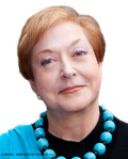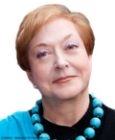
That phrase is considered traditionally to be a part of the Hippocratic Oath that physicians take upon becoming doctors, or at least they used to take. One of my favorite physicians has the Oath framed outside his office door; it’s done in beautiful needlepoint. It comforts me when I pass by it on my way in and out of the Women’s Room during my infusion-therapy sessions.
The actual text of the Hippocratic oath doesn’t say exactly that but it says not to do harm to anyone. Physicians and harm have been on my mind in the last weeks and have prompted me to break my silence and return to the task of chronic healing. One of the ways I can help myself (and maybe offer a connection to others) is to begin to write this blog again, and regularly.
Several weeks ago, Michael Lockshin, M.D., my doctor of more than three decades and my co-author and collaborator, decided to retire. The news hit me as though yet another disease or a new flare had assaulted me. My first response was selfish and childish. I mean, how could he do this to ME? I wept. I want to lie and say I didn’t cry in front of him, but I did. We probably all did; he’s that kind of a doctor. He’s the living manifestation of “First, Do No Harm.” Since most of his patients are in a muddle of unending chronic autoimmune disease, I suspect many of us jumped to the next place – the fear of getting a new physician who would harm us. When I collected myself, I wrote Dr. Lockshin a letter that I trust communicated how much I valued all he had done for me and how patient he had been with this patient. And I’ve given him cause to be impatient in these decades, but he’s remembered the hard job it is to be chronically ill. It is part of his rare gift and at the core of his essential goodness as a man and a healer.

Then, the unthinkable happened, because that’s what the future is: it is both unthinkable and unknowable. A screening test revealed the need for a biopsy. Following what should have been a routine out-patient procedure, the surgeon caring for me, without warning or prologue announced a potentially lethal diagnosis. The pathology report was a surprise to this surgeon and his recommendation was the standard one in his field – major surgery immediately. However, the manner in which he told me was confusing, terrifying and counter-productive. I was sure I was dying of last stage cancer. It took me a long time, and some agonized conversations with other doctors to understand it was pre-cancerous, but must be taken seriously.
This surgeon is highly respected and extremely skilled. He wants the best for all his patients. He saves lives. He never intends to do harm. But his words were far more lethal than the diagnosis. And the aftermath of our meeting sent me into a mini-flare of my autoimmune problems and into a downward spiral of despair. I am reminded of my late friend Dr. Samuel Bloom’s fine book, The Word As Scalpel. Below is the direct quotation from the Google e-book review of Dr. Bloom’s book on its website:
"A doctor can damage a patient as much with a misplaced word as with a slip of the scalpel." In this statement, from Lawrence J. Henderson, a famous physician whose name is part of the basic science of medicine, epitomizes the central theme of The Word as Scalpel. If words, the main substance of human relations, are so potent for harm, how equally powerful they can be to help if used with disciplined knowledge and understanding. Nowhere does this simple truth apply more certainly than in the behavior of a physician.
Rheumatologists, by their own admission, must become comfortable with uncertainty, with ambiguity, with complexity, with mixed, confused and even conflicting diagnoses. They are the patient healers because they know the trajectory of these diseases humbles them as well as their many patients. The surgeon population is filled with a different kind of healer. Their training, their skills, new diagnostic techniques and surgical ones as well, provide them with the ability to cure patients. And when a surgeon has a particular gift, he or she can indeed be called a lifesaver. If I had a magic wand, and not a scalpel, I would ask of the surgeon-healers that they soften their words. It won’t change a thing about how much they are valued or needed, but it will change the dialogue and perhaps that will save even more lives.

© Alida Brill 2012

